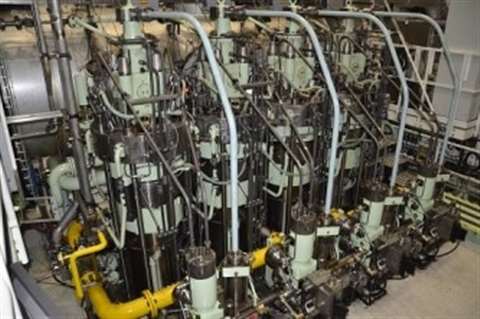MAN takes order for first low-speed ME-GA engines
08 July 2021
Engine introduced in March
The first order for MAN Energy Solution’s low-speed ME-GA engine has been placed by Hyundai Heavy Industries’ Engine Machinery Division (HHI-EMD).
HHI-EMD ordered two 5G70ME-GA10.5 dual-fuel engines for each of six 174 000 m3 LNG carriers for shipowners KLC (2 vessels), PANOcean (2), Knutsen (1) and JP Morgan (1). Hyundai’s Shipbuilding Division (HHI-SBD) will construct the vessels in Korea, which will be chartered by Shell Tankers (Singapore) Private Limited on delivery to the shipowners.
Delivery of the first engine is scheduled for August 2022, with the final unit arriving during the following year. MAN Energy Solutions reports that each of the engines will incorporate its proprietary exhaust gas recirculation (EGR) system for emissions reduction.
 The New ME-GA dual-fuel engine was unveiled during a livestream from MAN Energy Solutions’ Research Centre Copenhagen on March 18, 2021. The new engine is an Otto-cycle variant of the company’s ME-GI engine.
The New ME-GA dual-fuel engine was unveiled during a livestream from MAN Energy Solutions’ Research Centre Copenhagen on March 18, 2021. The new engine is an Otto-cycle variant of the company’s ME-GI engine.
“Following our virtual launch event in March this year, we have experienced overwhelming interest from shipowners, shipyards, engine builders and charterers in ME-GA,” said Bjarne Foldager, senior vice president and head of Two-Stroke Business, MAN Energy Solutions. “We are very excited about this first order and are looking forward to a successful, close cooperation with all parties to ensure the engines meet the high performance and reliability level expected of them.
“The ME-GA’s genesis owes much to us recognising a strong market desire for a lower-cost alternative to the ME-GI engine, driven primarily by the LNG carrier market. Accompanied by our EGR system – a proven concept with a decade of experience behind it – these engines will deliver lower methane-slip compared to existing, Otto-cycle LNG engines, and better fuel-efficiency in both gas and fuel-oil modes. This further confirms our leadership in the critical, dual-fuel, marine segment.”
MAN Energy Solutions reports that its portfolio of two-stroke, dual-fuel engines has accumulated over 1.7 million operating hours from the 158 engines currently in service – all running on clean fuels such as LNG, LPG, ethane and methanol. With fuel prices and availability currently in flux, MAN Energy Solutions expects the option of retrofitting to dual-fuel engines to increasingly become a necessity.
MAN Energy Solutions said the high-efficiency MAN B&W ME-GA engine delivers a low CAPEX solution aimed at certain vessel types and applications, such as LNG carriers, that are able to use ‘boil-off’ gas as a source of fuel. It could also be of appeal to smaller vessels where low capital outlay is a priority.
With Tier 3 compliance in gas mode, the engine meets all current and upcoming NOx emission regulations with the addition of EGR.
In November 2020, MAN Energy Solutions had announced that it would offer its proprietary EGR system as an emissions solution for the ME-GA. EGR is a NOx-emissions-reduction technique that ensures IMO Tier III-compliance in diesel mode for the ME-GA.
The company reports that EGR will enable the ME-GA to reduce specific gas consumption by ~3%, and specific fuel-oil consumption by 5%. It will also significantly reduce methane slip by 30 to 50%, and improve the stability of the Otto-cycle combustion process. EGR will enable the ME-GA to meet Tier III requirements in both fuel oil and gas modes without additional aftertreatment.
The ME-GA EGR solution is an engine-integrated design that interacts with the exhaust gas before the turbocharger, and can be integrated into existing engine-room designs since the EGR unit itself does not change the engine footprint. Its design-similarity to that of ME-C engines’ EGR systems will lower its price point, since the supply chain and components are already matured.
The volume requirements of the ME-GA EGR system are also significantly lower with, for example, less pipework required than for low-pressure EGR solutions.
The Maritime Energy Transition
MAN Energy Solutions believes that it is time for what it terms a ‘Maritime Energy Transition’ to find clean, decarbonised solutions for seaborne trade and transportation. Essentially, it is the company’s call to action to reduce emissions and establish natural gases as the fuels of choice in global shipping. It strongly promotes a global ‘turn to gas’, driven by the IMO, and a common approach by the shipping industry and politics to invest in infrastructure development and retrofits.
STAY CONNECTED




Receive the information you need when you need it through our world-leading magazines, newsletters and daily briefings.
POWER SOURCING GUIDE
The trusted reference and buyer’s guide for 83 years
The original “desktop search engine,” guiding nearly 10,000 users in more than 90 countries it is the primary reference for specifications and details on all the components that go into engine systems.
Visit Now
CONNECT WITH THE TEAM










